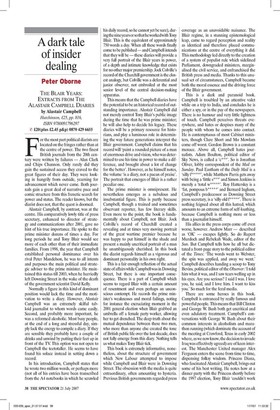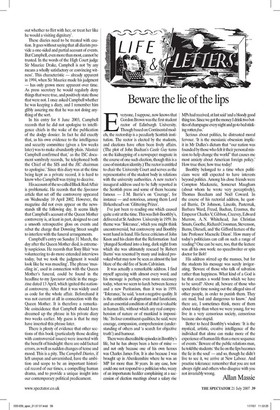A dark tale of insider dealing
Peter Oborne THE BLAIR YEARS: EXTRACTS FROM THE ALASTAIR CAMPBELL DIARIES by Alastair Campbell Hutchinson, £25, pp. 816, ISBN 9780091796297 £20(plus £2.45 p&p) 0870 429 6655 For the most part political diarists are located on the fringes rather than at the centre of power. The two finest British journals from the 20th century were written by failures — Alan Clark and Chips Channon. Only rarely did they gain the sustained access they craved to the great figures of their day. They were looking in hungrily from outside, yearning for advancement which never came. Both journals gain a great deal of narrative pace and comic structure from this frenetic search for power and status. The reader knows, but the diarist does not, that the quest is doomed.
Alastair Campbell, by contrast, was at the centre. His comparatively lowly title of press secretary, enhanced to director of strategy and communications after 2001, gave no hint of his true importance. He spoke to the prime minister dozens of times a day. For long periods he and Tony Blair would see more of each other than of their immediate families. From 1998, the year that Campbell established personal dominance over his rival Peter Mandelson, he was to all intents and purposes the main political and strategic adviser to the prime minister He maintained this status till 2003, when he hurriedly left Downing Street in the wake of the death of the government scientist David Kelly.
Normally a figure in this kind of dominant position would lack the time and the motivation to write a diary. However, Alastair Campbell was an extremely skilful tabloid journalist to whom words came easily. Second, and probably more important, he was a reformed alcoholic. Most busy people, at the end of a long and stressful day, simply lack the energy to compile a diary. If they are sensible they probably have a couple of drinks and unwind by putting their feet up in front of the TV. This option was not open to Campbell the teetotaller. He seems to have found his solace instead in setting down a record.
In his introduction, Campbell states that he wrote two million words, or perhaps more (not all of his entries have been transcribed from the A4 notebooks in which he scrawled his daily record, so he cannot yet be sure), during the nine years or so that he workedwith Tony Blair. This is the equivalent of approximately 750 words a day. When all these words finally come to be published — and Campbell intends that they will be — these diaries will provide a very full portrait of the Blair years in power, of a depth and intimate knowledge that exists for no other major premiership. Jock Colville's record of the Churchill government is the closest analogy, but Colville was a deferential and junior observer, not embroiled at the most senior level of the central decision-making apparatus.
This means that the Campbell diaries have the potential to be an historical record of outstanding importance. Alastair Campbell did not merely control Tony Blair's public image during the time that he was prime minister; he will also help to decide his legacy. These diaries will be a primary resource for historians, and play a luminous role in determining the way future generations interpret the Blair government. Campbell claims that his record will 'paint a rounded picture of a man of enormous drive and vision, who was determined to use his time in power to make a difference, and brought about a lot of change for the better'. However, as he himself notes, the volume 'is a diary, not a paean of praise'. The portrait that emerges of Blair is a rather peculiar one.
The prime minister is omnipresent. He nevertheless emerges as a nebulous and insubstantial figure. This is partly because Campbell, though a trained and sometimes observant reporter, has few literary skills. Even more to the point, the book is fundamentally about Campbell, not Blair. Jock Colville's record of Churchill created a revealing and at times very moving portrait of the great wartime premier because he was happy to put himself in the shade and present a mainly uncritical portrait of a man he unambiguously cherished. In this book the diarist regards himself as a vigorous and dominant personality in his own right.
This is a fair enough reflection of the actual state of affairs while Campbell was in Downing Street, but there is one important consequence. There is a part of Campbell which seems to regard Blair with a certain amount of resentment and even perhaps an unconscious contempt. He records the prime minister's weaknesses and moral failings, noting for instance the excruciating moment in the 2001 general election when Blair grabbed an umbrella off a female party worker, allowing her to get drenched. The deep truth about the mutual dependence between these two men, who more than anyone else created the tone of British public life over the last decade, does not fully emerge from this diary. Nothing tells us what makes Tony Blair tick.
This book is extremely informative, nonetheless, about the structure of government which New Labour attempted to impose while Campbell and Blair were in Downing Street. The obsession with the media is quite extraordinary, often amounting to hysteria. Previous British governments regarded press coverage as an unavoidable nuisance. The Blair regime, in a stunning epistemological leap, came to regard perception and reality as identical and therefore placed communications at the centre of everything it did. This methodology led directly to the creation of a system of populist rule which sidelined Parliament, downgraded ministers, marginalised the civil service, and enfranchised the British press and media. Thanks to this unusual set of circumstances, Campbell became both the moral essence and the driving force of the Blair government.
This is a dark and paranoid book. Campbell is troubled by an attentive valet while on a trip to India, and concludes he is either a spy, or in the pay of the newspapers. There is no humour and very little lightness of touch. Campbell perceives threats everywhere, and hates or despises many of the people with whom he comes into contact. He is contemptuous of most Cabinet ministers, though Clare Short and Mo Mowlam come off worst. Gordon Brown is a constant menace. Above all, Campbell hates journalists. Adam Boulton, political editor of Sky News, is called a c***'. So is Jonathan Oliver, lobby correspondent of the Mail on Sunday. Paul Eastham of the Daily Mail is a 'silly f*****', while Matthew Parris gets away with being a 'little s***' and Simon Jenkins is merely a 'total w*****'. Roy Hattersley is a `fat, pompous b*****' and Bernard Ingham, Campbell's predecessor as Downing Street press secretary, is a 'silly old f*****'. There is nothing feigned about all this hatred, which amounts to an extreme form of self-loathing, because Campbell is nothing more or less than a journalist himself.
His allies in the press corps come off even worse, however. Andrew Marr — described as 'OK' — escapes lightly. So do Rupert Murdoch and Rebekah Wade, editor of the Sun. But Campbell tells how he all but dictated a front-page story to the political editor of the Times: 'The words went to Webster, the spin was applied, and away we went.' Campbell describes handing a scoop to Tony Bevins, political editor of the Observer: 'I told him what it was, and I saw tears welling up in his eyes. Are you serious? I said I was. I love you, he said, and I love him I want to kiss you.' So much for the feral media.
There are some heroes in this book. Campbell is entranced by really famous and powerful people. This means that Bill Clinton and George W. Bush both get uncritical and even adulatory treatment. Campbell's conversations with George W. Bush about their common interests in alcoholism and marathon running (which dominate the account of the meeting at Crawford, Texas in early 2002 where, as we now know, the decision to invade Iraq was effectively agreed) are of keen interest. The Manchester United manager Alex Ferguson enters the scene from time to time, dispensing folksy wisdom. Princess Diana, who fascinated Alastair Campbell, brings out some of his best writing. He notes how at a dinner party with the Princess shortly before the 1997 election, Tony Blair 'couldn't work out whether to flirt with her, or treat her like he would a visiting dignitary'.
These diaries need to be treated with caution. It goes without saying that all diarists provide a one-sided and partial account of events. But Campbell, even more than most, cannot be trusted. In the words of the High Court judge Sir Maurice Drake, Campbell is not 'by any means a wholly satisfactory or convincing witness'. This characteristic — already apparent in 1994, when Sir Maurice made his judgment — has only grown more apparent over time. As press secretary he would regularly deny things that were true, and positively state those that were not. I once asked Campbell whether he was keeping a diary, and I remember him glibly assuring me that he was not doing anything of the sort.
In his entry for 8 June 2003, Campbell records that he did not apologise to intelligence chiefs in the wake of the publication of the dodgy dossier. In fact he did exactly that, as his own evidence to the intelligence and security committee (given a few weeks later) was to make abundantly plain. 'Alastair Campbell confirmed that,' as the ISC document sombrely records, 'he telephoned both the Chief of the SIS and the JIC chairman to apologise.' Since this diary was at the time being kept as a private record, it is hard to know who Campbell was trying to deceive.
His account of the so-called Black Rod Affair is problematic. He records that the Spectator article that set off the controversy appeared on Wednesday 10 April 2002. However, the magazine did not even appear on the newsstands till the following day. It seems likely that Campbell's account of the Queen Mother controversy is, at least in part, designed to cast a smooth retrospective gloss on events and rebut the charge that Downing Street sought to interfere with the funeral arrangements.
Campbell's entry on Sunday 31 March, the day after the Queen Mother died, is extremely suspicious. He records that Tony Blair 'was volunteering to do more extended interviews today, but we took the judgment it would look like he was muscling'. The phrase 'muscling in', used in connection with the Queen Mother's funeral, could be found in the headline to my Spectator article in the magazine dated 13 April, which ignited the national controversy. After that it was widely used as code for the whole affair. Beforehand it was not current at all in connection with the Queen Mother. It is therefore a remarkable coincidence that Campbell should have dreamed up the phrase in his private diary two weeks earlier. My guess is that he may have inserted this phrase later.
There is plenty of evidence that other sections of this book (particularly those dealing with controversial issues) were inserted with the benefit of hindsight: there are odd factual errors, as well as sudden changes of tense and mood. This is a pity. The Campbell Diaries, if left unspun and unvarnished, have the ambition and scope to be an important historical record of our times, a compelling human drama, and to provide a unique insight into our contemporary political predicament.













































 Previous page
Previous page